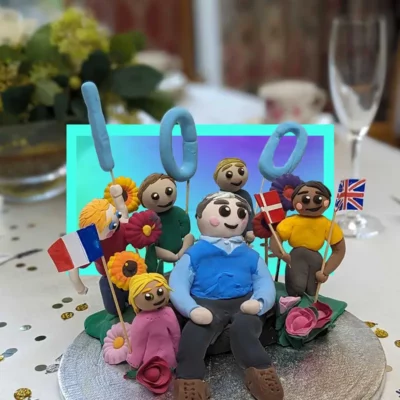Who is leading who?
As an artist and writer, Beth Lisick has had her share of freelance side gigs. But nothing can prepare her for this latest assignment: tending to the unforgettable Bill, who leads Beth on an epic journey through New York City. What she learns along the way: Everyone’s struggles are not immediately visible. And neither are the gifts they have to offer us.


Table of Contents:
Transcript:
Who is leading who?
BETH LISICK: I’ve always loved my side gigs: sitting in the jury box on “Law and Order SVU,” narrating museum tours, wearing a foam banana costume in the streets and convention centers, smiling while strangers tell me I should have stayed in college (which, by the way, I did). I’m used to my jobs being part of my creative life, a way of learning things and getting inspired. I thought this might be another interesting arrow in my quiver, but I had no idea, zero, what I was in for.
ROHAN GUNATILLAKE: If you already love Beth Lisick, it may be from her six books, including Everybody Into the Pool and Edie on the Green Screen. Maybe you know the beloved Porchlight Storytelling Series she co-founded, or her spoken word performances, or her film work. But Beth’s various side gigs over the years might be as striking as her creative work, and in today’s Meditative Story, she describes one that really shakes her, that is until she’s able to see the experience for its uncanny timing in her life.
In this series, we combine immersive first-person stories, breathtaking music, and mindfulness prompts so that we may see our lives reflected back to us in other people’s stories. And that can lead to improvements in our own inner lives.
From WaitWhat, this is Meditative Story. I’m Rohan, and I’ll be your guide.
The body relaxed. The body breathing. Your senses open. Your mind open. Meeting the world.
LISICK: The first time I meet Bill, he asks if I’d like to go to Russia. On Monday. He’s handsome, and impeccably dressed in a Tuscan yellow button-down and creased navy trousers. I learn he’s a retired doctor and living in a beautiful apartment building on New York’s Upper West Side.
He’s been to every major museum in the world, except the Hermitage, and he urgently wants us to go to St. Petersburg. Monday. Tuesday at the latest.
I don’t know how to answer at first, so I tell him I have to check with my husband. “If I go to Russia three days from now,” I say. “I have to make sure that he can watch our son.”
Bill looks me square in the eye, his face barely moving a muscle. “They can come,” he says. “And we will all fly The One. I only fly The One and I like to sit by the…” He pauses and starts again. “I like to sit by the…” His manicured surgeon’s hands arc together to form a small portal as he looks at me quizzically.
“The window?” I say.
“The window. You sit by the other one.”
“The aisle.”
Bill is in his early 60s, and has been diagnosed with frontotemporal dementia. It’s a neurodegenerative disease that erodes his decision-making, impulse control, command of language, and memory. This is my first day on the job and I’ve been instructed to “keep him out of trouble.” I’m not a social worker or a therapist. I am a 50-year-old artist who needs a side gig.
I’ve always loved my side gigs: sitting in the jury box on “Law and Order SVU,” narrating museum tours, wearing a foam banana costume in the streets and convention centers, smiling while strangers tell me I should have stayed in college (which, by the way, I did). I’m used to my jobs being part of my creative life, a way of learning things and getting inspired. I thought this might be another interesting arrow in my quiver, but I had no idea, zero, what I was in for.
When I meet Bill, I’m at a low point. My oldest brother Paul, who was autistic and had cerebral palsy, has recently died of an autoimmune disease (I love you Pauliewog), my longtime literary agency won’t help me sell the book I’ve been writing for years, I’m coming off a bout of Lyme disease, and I’ve just discovered I have a tumor that can only safely be removed by also removing my uterus. I’m done with it anyway.
I think I just described the precise demographic of someone willing to hop a last-minute flight to Russia with a total stranger who has dementia.
But I’ve been warned this Hermitage trip is merely Bill’s latest obsession, and he is not, under any circumstances, allowed to go. Apparently, his behavior is getting erratic. He no longer tolerates loud talking or anyone touching him. That’s challenging for someone who likes to spend his days walking the streets of New York City. He has recently been arrested for kicking a small child who accidentally brushed up against him on the sidewalk. When I hear how he flees the scene, ducking into the Guggenheim Museum, and speed walking up the iconic spiral ramp where he is tackled by the police, I so appreciate his dramatic flair.
At the same time, I know Bill is going to be A LOT. I learn companions have come and gone. I’m patient, sure, but my personal struggles have left me feeling a bit depleted. I promised at my interview I would give it my best shot. I’m fully expecting to dip into reserves I’m not even sure are there.
It’s a swampy August afternoon. Bill stands stiffly in his lobby, staring out at the street, waiting impatiently. He refuses to use revolving doors, touch handles, or press elevator buttons. I nod, push open the door and hold it for him, gesturing comically for him to please proceed. He doesn’t think I’m funny. He exits quickly without turning around and off he goes. What just happened?
I hurry to catch up. He crosses against the light and while cars stack up, he pauses to count the painted stripes in the crosswalk. The honking starts.
“Oopsie, we should get out of the intersection,” I say.
He glowers. “Fifteen.”
Hoo boy. What am I doing?
GUNATILLAKE: This is feeling a bit chaotic for Beth, isn’t it? But for Bill, by counting maybe there is some kind of order for him. There is a lesson here of how something as simple as counting can be an anchor when everything around us feels too much. So let’s do it ourselves. Count your breaths until the story returns. The breath and the numbers, an anchor.
LISICK: I’ve been told Bill doesn’t have that much longer to live. I’ve also recently heard about the concept of the therapeutic use of self, so I decide that I will simply do what I can to make his days as enjoyable as possible. I think of my brother Paul, whose slightly odd mannerisms and social skills made it so difficult for him to make friends even though he was The Kindest. He would play miniature golf alone. Why wasn’t I there for him more? And what about my elderly, grieving parents? Why am I on the other side of the country looking after a stranger when they can’t get on a ladder to change the lightbulb in the hallway?
In front of me, Bill tries to kick a passing food delivery scooter. I can see why others walked away, but in this moment, I push everything else out of my mind, trying to use my actor’s training to stay in the moment. Be open to what’s happening here and now.
I scan for impending disasters. Skateboarders, tourists, teenagers, strollers, dogs, so many people looking down at their phones. Every time someone comes near, Bill either kicks out at them or stops in his tracks and almost gets bumped from behind. After a few near misses, I step in front of him and try to make myself big, effectively blazing a trail as he follows.
I keep heading east, but on one of my glances back at him, I see he’s peeled off. My heart pounds until I spot his bald spot outside a fancy boutique hotel. The uniformed doorman opens the door and we enter the quiet, dark wood-paneled lobby. The AC is such a relief, and so is the break from the relentless landmine energy of the streets. My pulse slows back to a normal range, and I stop sweating quite so relentlessly. Then I look around. But what are we doing here?
Bill walks up to the desk clerk and says, “Give me six.”
Six? Six what, Bill?
“That will be $130.65. You can wait on the sofa and we’ll bring them down.”
We sit next to each other in the cool, soft-jazz space. Waiting. Waiting. Five minutes. Seven minutes. We sit in silence. Bill starts to get upset. He bolts up and walks behind the desk, straight back into the office. Oh no. My heart races all over again.
“Sir. You can’t be back here, sir.”
The clerk looks at me to do something.
“Hey, Bill?” I try. “Could you…?” He won’t move. He’s staring straight ahead blocking the doorway. I try to imagine his perception of things, his reality – another useful tool for artists (or for anyone, frankly.) He looks like he can’t even hear us.
A woman finally appears holding six immaculate drawstring bags and Bill points at me. She bundles them into my arms and I can now see that they’re slippers. Plush hotel slippers. They know what he wants without him saying it so he must come here regularly. Does he have a weekly hotel slipper budget?? No one has told me. We walk out onto the churning street. I check my phone for the time — six more hours to go. Bill leads me to the Metropolitan Opera House where he buys us two tickets to La Traviata.
So we may not be going to Russia, but it’s clear Bill will be bringing me places I haven’t been before. Places I would never go otherwise. I make a choice every time I meet with him. On a moment-by-moment level, that choice might seem a little odd. Six pairs of hotel slippers! But I start to see a bigger choice — a choice to get out there each day, come what may. Something feels different. It dawns on me. Who is leading who? Go with it.
As the months pass, I start to learn his quirks and rhythms. He seems happiest when he’s walking the streets wearing a colorful outfit, say a salmon shirt, a yellow sweater, peach pants. And people notice him.
Hey, you’re blinding me over here, buddy!
Kudos! Kudos to you for bringing color to my day!
Sometimes I notice the hint of a smile on Bill’s face. I try to figure out how to see more of it. It’s not easy. He’s led an incredibly privileged life, he’s traveled all over the world – it’s hard to impress him. Plus he knows he’s dying. I often catch him looking at a photo of his brain scan that he keeps on his phone.
GUNATILLAKE: Is there something you come back to again and again, that switches you away from the joy and brightness, symbolized here by Bill’s bold clothing? There are things we have in our lives that have their own kind of gravity. What might it be like to let them go, to leave them alone, to surrender them?
LISICK: During the day, we pop in at one of the many museums where his name appears on the donor wall – he’s proud of that – or we go to the movies, the ballet, classical and jazz concerts, senior citizen afternoon dance parties. We feed ducks in Central Park or he has me row him around the lake, sometimes in the rain, while he sits perched like a prince on the bow with his umbrella hoisted above him, firing off terse directions of where I should paddle. He wants a picture at the grave of his grandfather, his namesake, so one day I drive us to a cemetery in Staten Island. In my car, he bops his head along to Echo & The Bunnymen and then there he is, standing unsmiling in front of a tombstone with his own name on it. It’s haunting. I tell him about my brother’s tombstone that says Omnia Mutantur Nihil Interit from Ovid’s The Metamorphoses. Everything Changes, Nothing Perishes. He doesn’t respond, but it feels good to say it out loud.
Every afternoon, we wind up at a diner in his neighborhood, and this is where we have our most relaxed time. He has a hamburger, or two, or a couple times, three. Always with two French fries. He uses one to delicately paint the ketchup on his burger before offering both fries to me. We sit for hours and play Tic Tac Toe, which he calls The Nines. My notebook is full of hundreds of games of The Nines. Bill won’t hold the pen, but points to where he wants me to put the X. X-O-X-O-X-Oh my gosh it gets tedious sometimes. But what works is to imagine I have absolutely nothing more pressing or interesting or important to do than this. It’s a funny thing. When you let go of the alternatives, you can’t help but choose what’s in front of you.
Bill and I begin talking, kind of. His spoken vocabulary is limited, but I write out words and draw pictures. I find out he was married twice. He used to speak fluent Spanish. He has patents for fat-free half-and-half, a reusable ice cream cone, and a toilet seat for people with wider butts. He likes that both of our names start with B and begins calling me “The B-e.” “I would like The B-e tomorrow at 11 a.m.” At stressful times, I take it as a reminder to just b-e in the moment and b-e calm and not b-e a b-i-t-c-h.
But there are so many daily disasters, so many moments when a white prickly panic surges throughout my body. Bill brazenly cuts a 40-person line at Trader Joe’s. We get 86ed fifteen minutes into a movie because Bill won’t stop kicking the seat in front of him. Bill blows his nose and throws the Kleenex on the ground in the aisle of a church. He’s rude and intimidating, something I will never be able to change. I apologize to stranger after stranger.
It’s nearing Thanksgiving and Bill and I are on one of our rambles near Columbus Circle. It’s always nerve-wracking when he wants to walk somewhere crowded, but I also know that being in the thick of things helps him remember who he is, who he’s been in the world. We’re walking along and he suddenly stops at an empty storefront. The windows are papered over and it’s obviously vacant. He is often compelled to go into places he’s not supposed to be.
“Did you used to come here, Bill?” I ask. “Did this used to be someplace you knew?”
He looks at the door and then at me. “Open it.”
“Well, it looks like it’s not open anymore. I’m sorry.”
“OPEN IT,” he scowls. Pedestrians are flying by and I cage my arms around him to protect him. He won’t let it go. OPEN. I lose my patience and grab the door handle and push, to show him he is wrong, it is locked, but the strangest thing happens. The door opens.
Bill, unfazed, walks in.
I hurry in after him, ready to launch into my whole campaign to roust him, when I look around and see we are surrounded by a fleet of twenty-foot-high reindeer and enormous glittering candy canes. Giant elves smile out at us and oversized baubles and ornaments create a maze across the floor. There are carpet rolls of fluffy fake snow, and golden garlands and massive wreaths. It’s like we’re tiny creatures in a winter wonderland for giants. It must be the storage spot for the holiday display going up later this week. There are no people here and it is silent and we are safe.
Bill turns back to look at me and he’s smiling. He points up to a pair of towering angels. He wants to make sure I’m seeing what he’s seeing. I can totally see his kid face and for the first time I glimpse a different version of him before his disease. Not the serious, accomplished doctor and scientist and art collector, but someone who can relax for a moment and be full of wonder.
When he’s sure he’s seen everything, he leads me back out. The door shuts behind us and we’re standing back in the rush of foot traffic, everyone oblivious to our secret.
Bill and I are together for sixteen months, during which I also accompany him to a series of doctors’ appointments. The outlook isn’t great. So when my phone rings one evening, it’s a shock but not a surprise. He’s died suddenly of a heart attack. Just like my brother did. I burst out in tears. A montage of our adventures floods my brain. The carriage ride in the park, an Alvin Ailey dance workshop, and our unexpected and magical discovery that one November day.
This “side gig” turns into a real job for me, different from the others. I move on to new clients with new challenges. Every day is an opportunity to think about patience and gratitude and being of service. Everyone’s struggles are not immediately visible. And neither are the gifts they have to offer us. They heal a little bit and so do we.
When I first meet Bill I’m not sure I have enough energy to give some of it away to somebody else every day. But I realize pretty quickly that by giving it, it’s also coming back to me in a form I need. An alchemy none of us can know until we’re there. So often when Bill would walk around, I’d have no idea where we’re going or why. But I keep staying open. In that attention to him and in these moments, I come to see that I am doing what I wanted: helping him have better days. It turns out that becoming the B-E for Bill leads me to someplace I really want to be too.
Rohan’s closing meditation
GUNATILLAKE: The image of Bill and Beth taking their walks around New York brought to mind for me a memory from a long time ago. Back from my early school or maybe preschool years when my teacher would put a blank piece of paper in front of us with a pencil and invite us to take the pencil for a walk.
I actually don’t remember much from my childhood, but this is something that I do recall with fondness. The playful meandering of the pencil, letting the bodymind go free.
I still do it sometimes, and it’s a trip. Watching the mind wanting to take control, to make meaning from the scribbles, and underneath all that simple movement of chaos and flow.
I’d recommend you give it a try if you like to see what I mean.
And we can do something similar now if you like. And take our minds for a walk.
Let it walk like Bill. Let it go where it wants, witnessing it like Beth does, only nudging it maybe when it’s somewhere unsafe.
This is a deceptively simple meditation. Just watching the mind while it does its thing, plays out its momentum. But you’ll notice the urge to get involved, to want the mind to be a certain way, to nudge and to steer, and of course to commentate.
Beth talks about how it’s her actor’s training to stay in the moment, to be open to what happens. For us, it’s our mindfulness training. I’ll let him show me how to do this job, Beth says. Can we let our mind show us how to be aware?
Start again.
Watch the mind wherever it goes. Let it walk, and be with it as it walks.
When we do let things walk, sometimes we do end up kicking something we maybe shouldn’t. But sometimes we can end up in a place of miracles, a store of delights you never realized was there unless you pushed on the open door without assuming it was locked.
Thank you Beth.
And of course thank you Bill.
And of course thank you.





